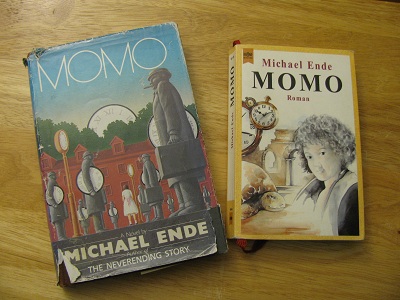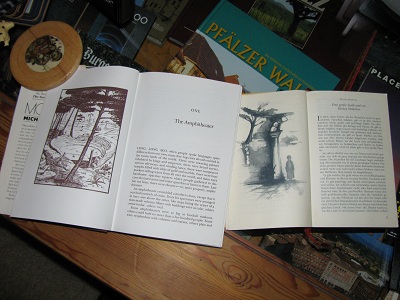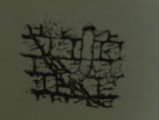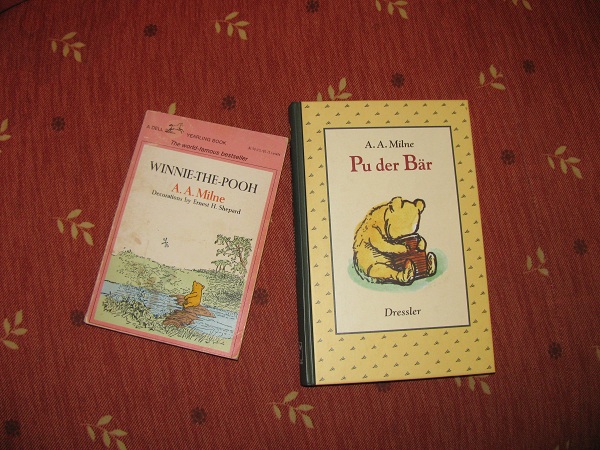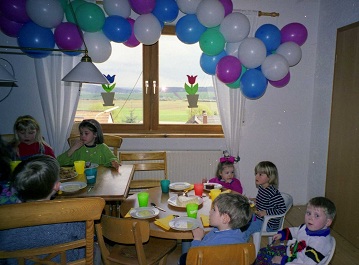Sonderling Sunday – Book of a Thousand Days – Day 6
It’s time for Sonderling Sunday — that time of the week when I play with language by looking at handy-dandy phrases translated into German — from children’s books. You do not have to understand German, nor do you have to have read the books in question, in order to enjoy this. You simply have to be a little bit of a Sonderling — a little nerdy.
Today I’m going back to Shannon Hale‘s Book of a Thousand Days, Buch der Tausend Tage.
Last time, we left off on Day 6 of the 1000 Days of the title. This section begins on page 5 of the English original, and Seite 17 in the German version, but the German version counted all the front matter, and the English didn’t.
So, let’s start off with phrases you’re sure to want to use:
“dried and salted mutton” = getrocknetem und gesalzenem Hammelfleisch
I just like the sound of this one:
“boxes of candles” = Kisten mit Kerzen
“a stack of parchment” = einen Haufen Pergament
“flat barleycakes” = flachen Gerstenkuchen
“fresh mare’s milk” = frischer Stutenmilch
“crude term” = grobe Wort (not grosse but grobe. Interesting.)
“wrapped in dough” = in Teig gewickelt
“cooked on coals” = auf Kohlen gegart
“beautiful and bright” = schön und strahlend
“dried peas” = Dörrerbsen
“raisins” = Rosinen
“pinch of sugar” = Prise Zucker
“Delicious” = Köstlich
“lady’s maid” = Dienerinnendasein (Google: “servant be there inside”)
“then you’ll never hear me complain” = wird keine Klage mehr über meine Lippen kommen (“will no action over my lips come”)
Here’s a good one!
“Even so, she swears she’s starving.” = Dennoch schwört sie Stein und Bein, sie wäre am Verhungern. (“She swears she’s stone and bone from hunger.”)
Interesting, the translator didn’t translate this exactly.
English: “The mouth grumbles more than the stomach, my mama used to say.”
Translation: Die Augen sind grö?er als der Mund, hat meine Mama immer gesagt. That means “The eyes are bigger than the mouth,” which isn’t really the same thing at all.
I will go on with phrases from Day 11:
Here’s a phrase as lovely in German as in English:
“It tosses and bobs like a spring foal.” = Sie zuckt und ruckt wie ein Frühlingsfohlen.
“floating fevers” = Schlammfieber (“mud fever”)
“still in two braids” = noch zwei Zöpfe trug
“summer pastures” = Sommerweiden
“the hopping tune for buried pain” = die trällernde Weise für begrabene Schmerzen
“a lady in fits” = eine Dame mit Weinkrämpfen
“calluses” = Schwielen
“What a strange and wondrous time it was.” = Was für eine seltsame und erstaunliche Zeit war das!
“the secret language of ink strokes” = die Geheimsprache der Tintenstriche
Here’s a figure of speech that we saw last week in Der Orden der Seltsamen Sonderlinge! I still love it:
“when I tossed on my mattress” = wenn ich mich auf der Matratze wälzte (Google says that just means “I rolled on my mattress,” but I think it’s pretty clear that’s where we got the word “waltz,” so I much prefer to think of it as meaning “I waltzed on my mattress.”)
“mostly” = im Gro?en und Ganzen (“in the big and all”)
I’ve mentioned this one before, I know, but I like it so much:
“shriveled” = eingeschrumpelt
“ginger roots” = Ingwerwurzeln
“a world to do their bidding” = eine Welt, die nach seiner Pfeife tanzt (“a world that dances to their pipe”)
That’s all for tonight! Some fun ones. Can you use these phrases in a sentence? Or maybe let us know how they’d be translated into some other language? Have we hit on any interesting turns of phrase in some other language? How would you translate “It tosses and bobs like a spring foal,” “the secret language of ink strokes,” or “the hopping tune for buried pain”? Well, I’m going to eat something before I become Stein und Bein. (Ha! As if there’s danger of that!) Ah! Was für eine seltsame und erstaunliche Zeit war das!


